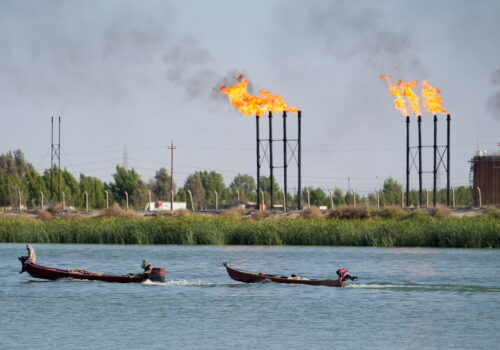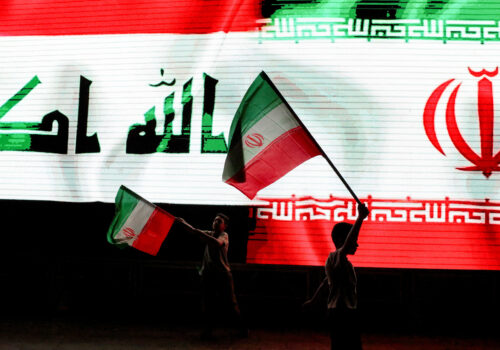Is the Baghdad-Erbil oil deal a blueprint for settlement—or a stopgap?
After nearly two and a half years, a fragile but consequential agreement between Iraq’s federal government in Baghdad, the Kurdistan Regional Government (KRG) in Erbil, the seven major Oil Companies (IOC), and a local Kurdish oil company has resumed oil exports through the Iraqi-Turkey Pipeline (ITP) to the international market.
At one level, the deal is a technical and legal arrangement to restart flows through the ITP. At another, it is a political experiment in reconciling federal sovereignty, regional autonomy, and contract sanctity in one of the world’s most complex political landscapes.
Ultimately, it is the politics surrounding the deal that made its negotiation so complicated—and its survival even more precarious. Oil remains a hyper-sensitive political issue in Iraq, and the agreement is already under strain.
Whether the framework will be a tactical stopgap or the first credible blueprint for a permanent settlement will likely become clear as Iraq enters the election and the budget year comes to an end in three months.
Details of the deal
The pipeline has been closed since March 2023, when the International Chamber of Commerce ruled that Turkey had violated the 1972 treaty between Iraq and Turkey that governs the pipeline. The court ordered Ankara to pay Baghdad $1.5 billion for unauthorized exports as the pipeline allowed the Iraqi Kurdistan Region to independently export its crude. While it was Turkey that closed the pipeline in response to the ruling, the primary obstacles to reopening the pipeline have been centered around the disputes over sovereignty and natural resources between Erbil and Baghdad, the powers of the federal government versus regional autonomy in Iraq, the sanctity of the contracts of the IOCs in the Kurdistan Region, the competing financial and political interests of the KRG, and contending political forces in Baghdad. The Association of the Petroleum Industry of Kurdistan estimates that more than $35 billion has been lost in revenues to the Kurdistan Region due to the shutdown.
SIGN UP FOR THIS WEEK IN THE MIDEAST NEWSLETTER
The technical and legal mechanics of the current agreement are highly complex, reflecting the balance between multiple competing constitutional, historical, political, commercial, and even geopolitical interests. The deal obliges the KRG to hand over a minimum of 230,000 barrels of oil per day to the federal government’s Ministry of Oil, while allowing the KRG to retain fifty thousand barrels per day for domestic use. The Iraqi government has accepted in-kind compensation from oil operators in the Kurdistan Region, shoulders pipeline transit fees, and agreed to international arbitration with a waiver of sovereign immunity. Erbil has relinquished its claim over oil exportation, curtailed its independent marketing, and the oil produced from the Kurdistan Region’s fields will be lifted as “Kirkuk oil crude, not Kurdish oil.” The IOCs have gained a guarantee of payments for production and transportation costs, with the production costs to be appraised later by an international consulting firm hired by the Ministry of Oil.
Politically, the arrangement represents both a victory and a concession for each side. The deal also notably represents a victory for the US government and its bid to bring more oil to the global market. Washington has been pressing to reopen the pipeline since its closure—and with US investors among the IOCs, the deal has removed a significant bilateral irritant.
With legislative elections slated for November, Shia political factions opposed to Prime Minister Mohammed Shia al-Sudani are likely to weaponize the agreement against him just as they worked against its conclusion. Al-Sudani invested significant political capital to reach this deal, which is a reflection of intense advocacy for it by the US government and his desire to maintain strong relations with the United States.
For those politicians opposed to al-Sudani, the Baghdad–Erbil oil arrangement offers a potent narrative: that the government has conceded too much to the KRG, or compromised national sovereignty to secure short-term fiscal stability. If the agreement becomes a campaign issue, al-Sudani will face pressure to revisit—or even repudiate—elements of it, regardless of its technical merits. In this sense, the upcoming November 11 parliamentary election represents as much of a threat to the deal as any operational or legal dispute. The overlap between the election cycle and the end of the budget year further compounds the risk, creating a moment when the government’s ability to shield the deal from partisan attacks will be at its weakest.
Baghdad has regained oversight of exports and embedded Erbil’s barrels within the federal budget law, satisfying a long-standing objective. The KRG has held on to its energy sector domestically, secured recognition of its production costs, and retained the ability to sell oil abroad at least for now, albeit under the State Organization for Marketing of Oil’s umbrella. Oil companies are seeing partial relief with the resumption of exports, and will receive their entitlements and costs reimbursed after a long hiatus.
However, uncertainty abounds—the deal is renewable every thirty days until December 31, 2025, underlining an absence of trust and leaving it exposed to vulnerabilities from potential political turnover, operational disruptions, and external shocks. In fact, the chains are tied together in a way that any technical issue or political hiccup could have a cascading impact, undermining months of negotiations. Although parties cannot back out unilaterally until the fixed end date in December 2025, the deal is more of a transitional truce rather than a final settlement.
Enduring challenges
Moreover, the agreement is unlikely to guarantee an uninterrupted flow of budget to the KRG. The Iraqi Ministry of Finance will continue to scrutinize KRG financial records, revenues, and audits. While Erbil hoped the deal would prevent Baghdad from withholding or delaying budget transfers under the pretext of oil-related disputes, challenges remain ahead. A senior Kurdish official noted to the author that the KRG tried to meet Baghdad’s terms to eliminate all excuses pertaining to budget delays, but emphasized that there are still fears regarding budget issues. This means that the unresolved budgetary issue could become a spike down the road.
The expiration of the ITP also poses an external threat to the agreement. Turkey has already indicated that a new treaty to govern the ITP must be negotiated by July 2026 for oil to continue to flow. Thus, even if the trio agreement holds, the looming expiry of the ITP could raise serious questions about the medium-term future of northern exports. Turkey may be seeking a broader energy arrangement that includes both gas and electricity, as well as demanding greater flexibility to contract other users, such as the KRG. This could mean that technical and/or financial disputes between Baghdad and Erbil may be overshadowed by negotiations with Ankara in the near future. Therefore, summer’s deadline is a hard stop: without a new treaty, the entire system risks a complete halt.
Will the deal survive the winter?
The coming months will illuminate the long-term viability of the agreement. On the one hand, the monthly renewals and the end date suggest a temporal nature of the deal. On the other hand, the structure introduces mechanisms that could endure. In-kind compensation avoids political disputes and reduces trust deficit. International arbitration with immunity waiver provides enforceability and a level of confidence not just to the IOCs, but to the whole Iraqi investment landscape.
Regardless, the stakes extend far beyond the mechanics of the agreement. The Kurdistan Region, and in fact the entire country, has already lost billions of dollars in revenue during the suspension of northern exports, and investor confidence in Kurdistan has plummeted. The resumption of flows could stabilize the federal budget and provide Erbil with some measure of fiscal stability. Yet the fragility of the deal should not be underestimated. A production shortfall, technical and legal issues, political turnover in either Baghdad or Erbil, or disputes between Iraq and Turkey over the arbitral award could quickly unravel the agreement. And even if those challenges are managed, the end of the ITP treaty in 2026 could emerge a structural cliff. Yet, If Baghdad and Erbil use this breathing space to negotiate a broader constitutional settlement on hydrocarbons and revenue sharing beyond these three months, this agreement may be seen as a turning point. If not, it will join the long list of short-lived oil bargains in Iraq’s turbulent history.
Victoria J. Taylor is the director of the Iraq Initiative in the Atlantic Council’s Middle East program. She served most recently as deputy assistant secretary for Iraq and Iran in the State Department’s Bureau of Near Eastern Affairs, where she advised senior State Department leaders on Iraq and Iran in the aftermath of the Gaza conflict.
Yerevan Saeed is a nonresident senior fellow with the Iraq Initiative in the Atlantic Council’s Middle East programs. Saeed is the Barzani scholar-in-residence in the Department of Politics, Governance & Economics at American University’s School of International Service, where he also serves as director of the Global Kurdish Initiative for Peace.
Further reading
Thu, Apr 3, 2025
Washington halted the Iraq-Iran electricity waiver. Here is how it’s perceived by Washington and Baghdad.
MENASource By Ahmed Tabaqchali, C. Anthony Pfaff
By making Iranian energy more costly, the United States hopes to incentivize Iraq to diversify its energy sources and reduce its dependency on Iran.
Wed, Sep 10, 2025
Ten questions (and expert answers) on Operation Inherent Resolve’s end in Iraq
MENASource By
This new frontier in the US-Iraq relationship leaves many opportunities, challenges and unknowns. Our experts unpack it all.
Mon, Jun 30, 2025
Balancing acts and breaking points: Iraq’s US-Iran dilemma
MENASource By C. Anthony Pfaff
The future of US–Iraq relations is neither as dim as it may first appear, nor as promising as one might hope.
Image: Workers adjust a valve of an oil pipe in Tawke oil field near Dahuk, 400 km (249 miles) north of Baghdad, November 24, 2010. In this part of Iraq, the hillsides sweat oil. Without any coaxing, the sticky black treasure oozes from the layered rock and gathers in pools that bubble as dissolved gases surface. Gradually, as the crude slips down the hillsides, it solidifies into a grey mass that resembles a hardened lava flow. It's a good metaphor for the progress of oil from the semi-autonomous Iraqi region of Kurdistan over the past five years: big on promise, small on delivery. Picture taken November 24, 2010. To match Special Report KURDISTAN/OIL REUTERS/Azad Lashkari/Files (IRAQ - Tags: ENERGY BUSINESS)


